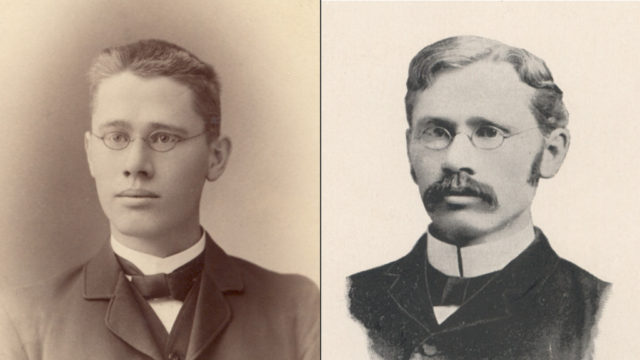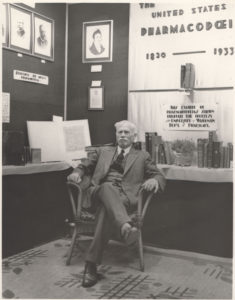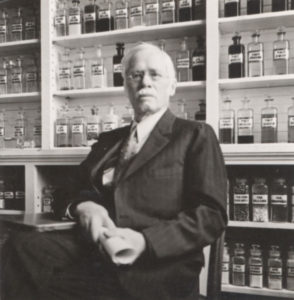
How Edward Kremers fought to bring the history of pharmacy to UW–Madison and innovated for the future
by Gregory Bond, American Institute of the History of Pharmacy
Photos courtesy of the Kremers Reference Files
The name “Kremers” probably sounds familiar—but unless you’re a University of Wisconsin–Madison School of Pharmacy history buff, or you listen intently during Dean Steve Swanson’s introduction of one the School’s prominent lecture series, you might not recall why.
Edward Kremers, whose legacy lives in the Kremers Lecture series that promotes leadership and excellence in pharmacy education, was the second director of the University of Wisconsin’s Department of Pharmacy. Despite meeting heavy opposition, Kremers introduced the world to a four-year degree in pharmacy, changing the course of the profession’s educational standards from the foundations to what would become the UW–Madison School of Pharmacy.
To enhance and deepen both the practice and understanding of pharmacy, Kremers also continuously pushed for the inclusion of humanities and history in pharmacists’ education.
Ultimately, his forward thinking would influence the future of the profession by carefully remembering the past, collected and held within the walls of the UW–Madison School of Pharmacy.
Promoting the value of well-rounded studies
“In our utilitarian and materialistic age, too little attention is given to history even in the academic courses of our colleges and universities,” declared 27-year-old Kremers, then director of the University of Wisconsin Department of Pharmacy. He was presenting a paper, “The Study of Materia Medica,” at the 1892 meeting of the American Pharmaceutical Association (APhA), providing a wide-ranging critique of the current state of pharmacy education.

Kremers encouraged the assembled delegates to broaden the scope of the pharmacy curriculum, and he strongly argued for the benefits of a well-rounded liberal arts education that incorporated the humanities and, especially, history. “The professional student should at least have a fair knowledge of the history of his profession,” Kremers declared, and he argued that philosophy and history, as well as the traditional pharmacy curriculum were “equally important in the symmetric development of a scholar.”
Kremers’ early and ground-breaking interest in the humanistic and historical aspects of pharmacy established the University of Wisconsin’s longstanding commitment to the study and preservation of the history of pharmacy.
Born in Milwaukee in 1865 to German immigrants, Kremers attended a German-style “Gymnasium” for high school and then apprenticed at a local German-style Apotheke. In addition to studying at the Philadelphia College of Pharmacy, Kremers earned his undergraduate degree in pharmacy from the UW Department of Pharmacy and then received his PhD from the University of Göttingen.
After completing his education, Kremers was hired by his former instructor and founding director of the UW’s Department of Pharmacy, Frederick B. Power. Just two years later, Power left his job, and Kremers was chosen to succeed his mentor as the director of the pharmacy department, a position he would hold until 1935. According to his biographer, UW–Madison School of Pharmacy Professor Emeritus Glenn Sonnedecker, Kremers approached his new job “with a missionary zeal for reforming American pharmaceutical education and practice.”
Setting the new standard for pharmacists’ education
Kremers’ primary goal was to improve the quality of pharmacy education at the University of Wisconsin and around the country. He strongly believed in raising the level of the pharmacy curriculum to match the quality of instruction in other disciplines on campus, and he wanted to fully integrate the Department of Pharmacy and pharmacy students into the larger university.
Almost immediately, Kremers instituted an optional four-year pharmacy course of study—the first of its kind in the United States—which led to a bachelor of science degree. When a skeptical UW President Thomas C. Chamberlin asked about the potential enrollment for the new four-year course, Kremers responded simply, “Mr. President, I am not concerned with numbers, but with an ideal.”
Humanistic inquiry was an integral part of Kremers’ proposed redesigned pharmacy curriculum, and his ideas proved immediately controversial. After listening to Kremers’s speech to the APhA in 1892, for example, Dr. Robert G. Eccles, the chairman of the APhA Committee on Pharmaceutical Education and Legislation and the dean of the Brooklyn College of Pharmacy, bluntly responded that, in his opinion, a pharmacy student studying both the “utilitarian” and the “historic” would find that “in trying to do too much, he will do nothing.”
By 1932, the four-year pharmacy course pioneered by Kremers at the University of Wisconsin had become the national standard.
Closer to home, the Wisconsin Pharmaceutical Association (WPhA) also initially objected to Kremers’ reforms. At the 1893 WPhA convention, members introduced a resolution expressing “great dissatisfaction” with the direction of the UW Department of Pharmacy and declared that the new educational initiatives didn’t fit “the practical duties of a pharmacist.”
Two years later at the WPhA convention, Kremers fired back and defended his curriculum. “The isolation of professional students is today one of the curses of professional education,” he declared. “Contact, daily contact with those whose thoughts run along other channels, is one of the greatest factors in true education of all students.”
Over the rest of the decade, Kremers’ ideas won more acceptance. By the end of the 19th century, several public institutions, including Michigan, Kansas, Purdue, and Auburn had followed Wisconsin’s example and introduced elective four-year courses in pharmacy, and many of the old-line private colleges of pharmacy began seeking affiliations with nearby colleges and universities to provide more well-rounded educations. By 1932, the four-year pharmacy course pioneered by Kremers at the University of Wisconsin had become the national standard.
Bringing the history of pharmacy to UW
During the early 20th century, Kremers focused more attention on his particular interest in the history of pharmacy. He was a driving force behind the founding of the American Pharmaceutical Association’s Historical Pharmacy section in 1904, and he was instrumental in locating, gathering, and preserving archival records and other materials for the benefit of future historians.

“It is not only of interest to study the past tendencies… and the conditions that influenced these tendencies, but it is of great importance as well. Only he who knows that past can intelligently look into the future,” Kremers declared. “For that future will be influenced by the past as certainly as it evolves out of the past.”
In 1907, Kremers introduced, for the first time anywhere in the United States, an elective class about the history of pharmacy. Since the introduction of this groundbreaking course, the UW–Madison School of Pharmacy has continuously offered its students a class about the history of the profession.
Kremers corresponded widely about his interest in the history of pharmacy, and, in the late 1930s, he played a critical role in bringing George Urdang to Wisconsin. A well-known editor of pharmaceutical journals and historian of German pharmacy, Urdang was a Jewish refugee from Nazi Germany, and his arrival and collaboration with Kremers in Madison helped spur the publication of the groundbreaking book, History of Pharmacy.
On January 22, 1941, Kremers, Urdang, and four other colleagues founded the American Institute of the History of Pharmacy (AIHP). Five of the six AIHP founders were associated with the UW–Madison School of Pharmacy, and, ever since, AIHP and the School have enjoyed a close and collaborative partnership dedicated to maintaining and enhancing Kremers’s lifelong work in promoting and preserving the history of pharmacy. Six months after participating in the establishment of AIHP, Kremers died in Madison at the age of 76.
Kremers’s voluminous correspondence and meticulous research notes now form the core of the Kremers Reference Files, an important historical research collection maintained by AIHP and the UW–Madison School of Pharmacy.
“Contact, daily contact with those whose thoughts run along other channels, is one of the greatest factors in true education of all students.”
–Edward Kremers
Today, Kremers’s legacy lives on in the School of Pharmacy and AIHP’s joint commitment to preserving and studying the humanistic and historical aspects of pharmacy practice, and utilizing that insight to push pharmacy forward.
Ever prescient, Kremers in 1911 anticipated the expanded role of pharmacists and knew that the profession would go beyond dispensing.
“It is [the] kind of work with its humanizing and hence its direct cultural aspects, which we need in our pharmaceutical curriculum… [because] it is most important […] in our day of rapid social evolution that the pharmacist of the future have a thorough appreciation of his own calling and of the important role which he as an individual is to play in the community in which he lives, not merely as a vendor of pills and patent medicines, but as a man of a profession, as a respected servant of the public in hours of sickness and sorrow, as well as in many other capacities of human trust in which an intelligent citizen may be called upon to serve his community.”
Learn more about the American Institute of the History of Pharmacy.